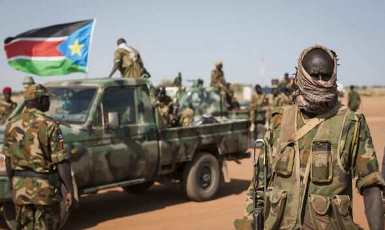Senior S. Sudan army officer arrested after troops abandon positions during rebel clashes
January 28, 2015 (JUBA) – The South Sudanese army (SPLA) has arrested one of its senior officers after troops in Unity state last week abandoned their positions amid sustained attacks from the rebel fighters.

Kiirnaar was immediately recalled to the capital, Juba, after government forces last week failed to halt the advance of rebel fighters in the western part of Parieng county at Toma South in Aliny payam (district), resulting in the loss of an oil-processing hub, which was subsequently set on fire.
Several attempts by government forces, as well as allied home guards and vigilant youth, were unable to halt the rebel offensive in the area.
A senior officer with SPLA’s fourth division in Unity state told Sudan Tribune on Wednesday that fighting between the rival forces had continued for three days until late Friday, when government troops under Kiirnaar’s command were forced to withdraw from the area.
Two tanks, one of which had run out of fuel and another with a flat tyre, were seized by rebel forces reportedly with backing by foreign troops.
The military leadership and the presidency have questioned why government troops and armed youth abandoned the area and allowed the capture of the tanks.
News of Kiirnaar’s arrest has been met with mixed reactions, with some local officials suggesting the move was motivated by local political differences.
“There has been serious talking since comrade Acuil was arrested. There are those who have been asking the circumstances under which the tanks were captured and there are those who have been citing a lot of things as a justification for [the] failure [of government troops] and the decision of the command to arrest him,” a legislator representing the area at the national legislative assembly told Sudan Tribune in an exclusive interview on Wednesday.
However, the legislator conceded that local politics were also involved and that Kiirnaar, who is perceived by many local politicians to have a large following among the different sections and clans in the area, may have been the victim of a personal vendetta.
“The other thing that has emerged – and it seems to be one of the serious contributing factors – is the involvement of local politics. It seems some people are taking advantage of the development and so twisted what transpired to suit their political interest,” he said.
“There are those who want Acuil to be moved away from the area because they fear he would not support them during the upcoming elections. So they want him to be removed from the command of the forces on the ground so that someone of their choice is deployed,” he added.
The lawmaker underlined that government troops in the area were left with little options than to abandon otheir positions after reinforcements and other essential supplies failed to arrive from Juba.
“The bitter truth is that our troops were not reinforced after three days. They were overwhelmed. Their morale prior to the attack was also low because of [the] lack of salaries and essential supplies. They had no repair equipment for combat vehicles,” he said.
He explained that some of the combat vehicles being used had mechanical issues, some of which broke down.
“There were inadequate stocks of ammunition and above all there was no food, no fuel. It was a challenging situation,” he said.
Multiple government and military sources have also conceded that the lack of proper coordination and delays in providing additional supplies to government forces in Parieng had contributed to their decision to withdraw.
This has been blamed on a lack of flights into the area and bureaucratic procedures and that delayed the release of funds from the ministry of finance and economic planning.
“When it comes to defence issues, the president has never hesitated to [give] direct approval of the funds, but the problem has always been with those who do the actual work,” one military officer told Sudan Tribune on Wednesday.
“The procedures and processes of approving money are long, even when it is an urgent request,” he added.
(ST)
